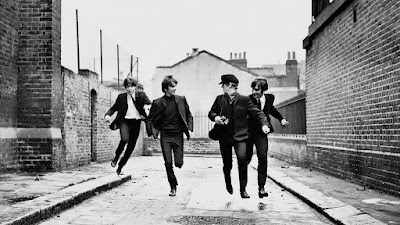Were there ever four moptops so famous, and so smart about their fame? Fifty years on from its first release, the reissue of A Hard Day’s Night arrives just as Bieber fever begins to go the way of the ague, coming in partway between the hard sell of One Direction: This Is Us and the hip posturing of The National’s Mistaken for Strangers as evidence this did once happen in popular culture: a band shifted millions of units, and remained not just loved, but enduringly, definably cool.
Richard Lester’s film greets the Beatles at the height of their 1963-64 fame – an epochal moment preserved forever in the title track's opening twang, played over shots of the Fab Four being chased around London by screaming female fans. What follows was as much an escape from drab reality as any subsequent mystery tour: Alun Owen’s screenplay takes as a throughline the band’s attempts to peg it and leg it and thereby evade not just these girls, but management, the media, eventually even the police.
This really was a band on the run, yet both its individual members and the harmonies they created together still hadn’t been entirely uprooted. The songs – “I Wanna Be Your Man”, “All My Loving”, “Can’t Buy Me Love” et al. – are recognisably the work of a close-knit gang thrashing something out in a garage, amusing themselves and one another; whatever new showbiz folderol the boys encounter, we sense it’s this music – this playing – that remains the fun part of the job.
As for the boys themselves, they’re presented as the kind of cheeky working-class scamps who pronounce “buffet” as “buffett”; they all have a gob on them, and spend sections of the film drinking, smoking and chasing girls, as they themselves are chased. (Compare this to the more guarded and businesslike This Is Us, where Zayn, Harry and the others displayed no real interest in doing anything other than that management had instructed them to do.)
For the other moment preserved here is a major keychange, a shift in a society swinging away from Old English conservatism, towards a more youthful, reckless energy. “I fought the War for your sort,” sniffs one commuter on the train-slash-cattle truck shuttling the band between engagements. “Bet you’re sorry you won,” is Ringo’s sarky response. The butler doddering to join the boys as they dash out to a promised gambling-den orgy is informed by John, in no uncertain terms, “you’re too old”.
The rabble-rousers are defined further by the presence of squarer, heavier-footed supporting presences: Norman Rossington, with his nightclub bouncer’s bearing and haircut as the band’s hapless manager; Wilfrid Brambell – just a year into Steptoe – as Paul’s fervently Fenian grandfather; Victor Spinelli as an uptight TV director; Derek Nimmo and Lionel Blair as passing turns.
Not all these light entertainment stalwarts could have understood what was being bottled here, but their exasperated reaction shots are an essential part of the joke: they provide the pillars of society around which our heroes can run rings. Lester, an American exile and a man of world cinema, knew a breathless set-up when he saw it: rejecting the antiquated Gainsborough-Ealing-Rank formulas, he instead oversaw the first British film cut to an off-beat, which matched his subjects’ energies perfectly.
The Beatles as caught here can’t sit still, already keen to explore all musical, cinematic and social possibilities; they were going places, in every sense. Darker clouds would eventually roll in – the tax battles, the obsessive fans, the musical differences – but A Hard Day’s Night now feels as joyous as any other day in the sun, and that spontaneity endures. John, Paul, George, Ringo and Richard gave us not just a record of this band in this moment, but something else: a timeless reminder of the considerable cultural advantages to be gained from allowing the young to run free and mess about.
(MovieMail, July 2014)
A Hard Day's Night screens on BBC2 this Wednesday at 12.20pm.

No comments:
Post a Comment